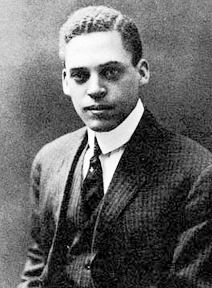Ernest Everett Just
| Ernest Everett Just | |
|---|---|
 |
|
| Born |
14 August 1883 Charleston, South Carolina |
| Died | 27 October 1941 (aged 58) Washington D.C. |
| Residence | United States, Italy, Germany, France |
| Nationality | American |
| Fields | biology, zoology, botany, history, and sociology |
| Institutions | |
| Alma mater |
Dartmouth College University of Chicago |
| Doctoral advisor | Frank R. Lillie |
| Known for |
marine biology cytology parthenogenesis |
| Notable awards | Spingarn Medal (1915) |
Ernest Everett Just (August 14, 1883 – October 27, 1941) was a pioneering African-American biologist, academic and science writer. Just's primary legacy is his recognition of the fundamental role of the cell surface in the development of organisms. In his work within marine biology, cytology and parthenogenesis, he advocated the study of whole cells under normal conditions, rather than simply breaking them apart in a laboratory setting.
Ernest Everett Just was born in South Carolina to Charles Frazier Just Jr. and Mary Matthews Just on August 14, 1883. His father and grandfather, Charles Sr., were dock builders. When Ernest was four years old, both his father and grandfather died. Ernest's father died of alcoholism. Just’s mother became the sole supporter of Just, his younger brother, and his younger sister. Mary Matthews Just taught at an African-American school in Charleston to support her family. During the summer, she worked in the phosphate mines on James Island. Noticing that there was much vacant land near the island, Mary persuaded several black families to move there to farm. The town they founded, now incorporated in the West Ashley area of Charleston, was eventually named Maryville in her honor.
When Just was young, he became severely sick for six weeks with typhoid. Once the fever passed, he had a hard time recuperating, and his memory had been greatly affected. He had previously learned to read and write with a great amount of excellence for someone so young. Now he had to go through the process all over again. His mother had been very sympathetic in teaching him but after a while, she gave up on him. Then one day, he read his first page — by himself, this seemed miraculous. He kept his new secret to himself for a month before telling his mother because he felt she had hurt him with her unreasonable expectations.
Hoping Just would become a teacher, at the age of 13 his mother sent him to the "Colored Normal Industrial Agricultural and Mechanical College of South Carolina", the only 1890 land grant school for the education of Negros in South Carolina, later known as South Carolina State University Orangeburg, South Carolina . Believing that schools for blacks in the south were inferior, Just and his mother thought it better for him to go north. At the age of 16, Just enrolled at the Meriden, New Hampshire, college-preparatory high school Kimball Union Academy. During Just's second year at Kimball, he returned home for a visit only to learn that his mother had been buried an hour before he arrived. Despite this hardship, Just completed the four-year program in only three years and graduated in 1903 with the highest grades in his class.
...
Wikipedia
